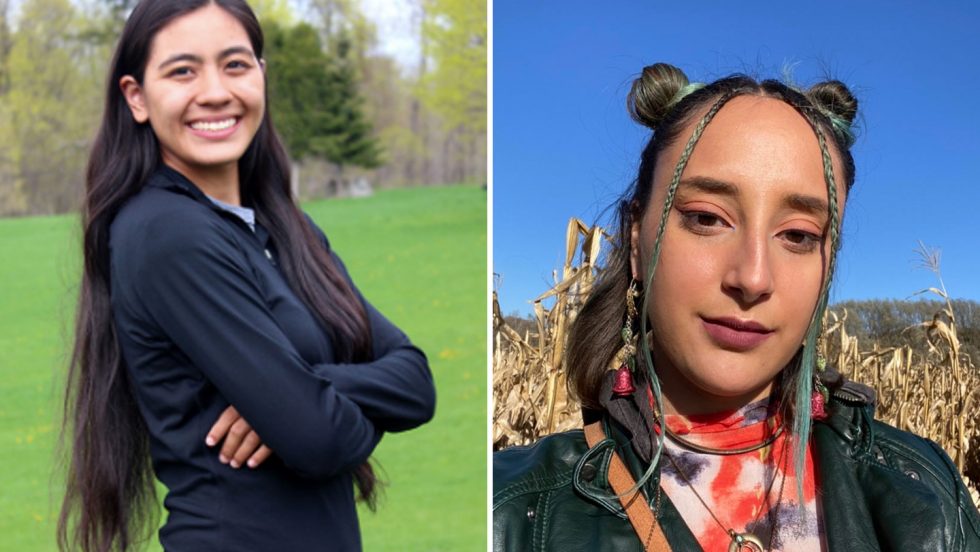
When a mutual friend introduced Sophia Powless '20 to fellow student Olivia Maybee, "I remember Olivia coming up to me and being like, 'You're Native—we're gonna be sisters!', and then we found out we were both Haudenosaunee and it was an instant connection."

The Onondaga greeting “Nya weñha Sgé noñ” is featured on the new welcome wall in the renovated Ruth S. Harley University Center.
Haudenosaunee is an alliance among six Native American nations: Oneida, Cayuga, Onondaga, Seneca, Mohawk and Tuscarora. Sophia Powless, who graduated in December 2020, came to Adelphi from the Onondaga Nation in 2017 to major in environmental studies and play volleyball. Olivia Maybee, from the Seneca Nation, is a junior majoring in art. She transferred to Adelphi in 2019.
The two not only connected, they formed the Indigenous Peoples Awareness Coalition (IPAC) and organized the first events honoring Native American Heritage Month at Adelphi.
Setting aside time to celebrate the culture, achievements and contributions of the Native American people began in 1986, when former President Ronald Reagan declared the week of November 23 to November 30 as American Indian Week. Every president since 1995 has declared November to be Native American Heritage Month.
Here at Adelphi, IPAC hosted four virtual events:
- Learning About Long Island’s Shinnecock Nation Through Art: Conversations With Jeremy Dennis
Award-winning Shinnecock tribal member Jeremy Dennis discussed Shinnecock history and how it can be understood in relation to art. - 1200+: A Documentary on the Epidemic of Murder and Missing Indigenous Women and Girls
Co-producer and former Grand Chief Sheila North discussed her film, 1200+, which is about the epidemic of Indigenous women who have disappeared or been murdered. - Native American Art Demonstration and Discussion
Artists Ikerson Hopper ’14, Sabryna Stevens and Chantel Joseph were the guests for this virtual discussion and demonstration about Native American art and culture. - Origins of Lacrosse
Lyle Thompson, world’s best men’s lacrosse player; Bradley Powless, an Onondaga cultural leader; and three Native American, Division I student-athletes, talked about lacrosse’s Native origins and discrimination they’ve experienced as players.
I spoke with Powless and Maybee about why they formed IPAC, how the events were received, and why, as guest speaker Chantel Joseph said, “The future is indigenous.”
Why did you both decide to form IPAC? Whose idea was it?
Powless: I was at Adelphi for a couple of years and it was really hard because I knew I was the only Native student. Last semester, I met Olivia and she was talking about the clubs she was in, in her old school, and when she asked me if there was anything like that here, I said no. She immediately suggested we do something, so we got a Google doc set up and started meeting with Professor [Katherine] Krasinski [PhD, assistant professor of anthropology], talking about issues in our nation and brainstorming ideas.
How did you bring the events together on such short notice?
Powless: Olivia had a lot of connections through her art department because she did a great job speaking on a panel on artists’ perspectives during the age of COVID-19 and Black Lives Matter, which rolled into organizing panels of her own, and then organizing events. This is going to sound interesting, but the pandemic helped us a little bit, because we had such amazing people on our panels that might not have been able to come [to campus] if we’d held the events in person. So [holding events virtually] kind of worked in our favor. We had a good turnout as well.
In the art event, Chantel Joseph said, “The future is Indigenous.” What does that mean to you?
Maybee: “The future is Indigenous” means more recognition on the political side. To me, it means more representation in Congress, [the] Senate and fighting for tribal sovereignty. I also believe Native people should be at the forefront of environmental rights because we have the greatest understanding of how we should be treating the Earth. Native people have been stewards of this land and have taken care of the land the way the Creator has taught us. “The future is Indigenous” means honoring those deep historical ties and practices and hopefully moving away from a society of fast consumption.
What are your future plans for IPAC?
Maybee: I want to get us on Instagram and have us approved as an official Adelphi club. I want to continue holding events and hopefully bring more keynote speakers from the Shinnecock Nation. There’s a huge community in New York City with a lot of Native artists and professionals, so I hope to team up with some organizations or Indigenous and Native American clubs at other universities. I guess it depends on the number of people who join, since Sophia [graduated] in December.
Powless: Yeah, I think that’s the biggest thing we worry about moving forward—the longevity. Adelphi requires clubs to have an e-board: president, vice president etc. But it’s been just the two of us who’ve done all this—reaching out to sponsors, panelists…we got all those people together. Most of the heavy lifting is divided between the both of us, and it’s a lot of work, but I feel like it has to come from us as Native people, because we’re the ones who experience this every day and understand the struggle. Thinking of moving forward is hard because Adelphi doesn’t have a huge Native population, but I want to make sure this is not just a one-time thing after I leave. I think that’s the hardest thing to think about.
Are you interested in joining IPAC? Contact Olivia Maybee at oliviawhite@mail.adelphi.edu to learn more.